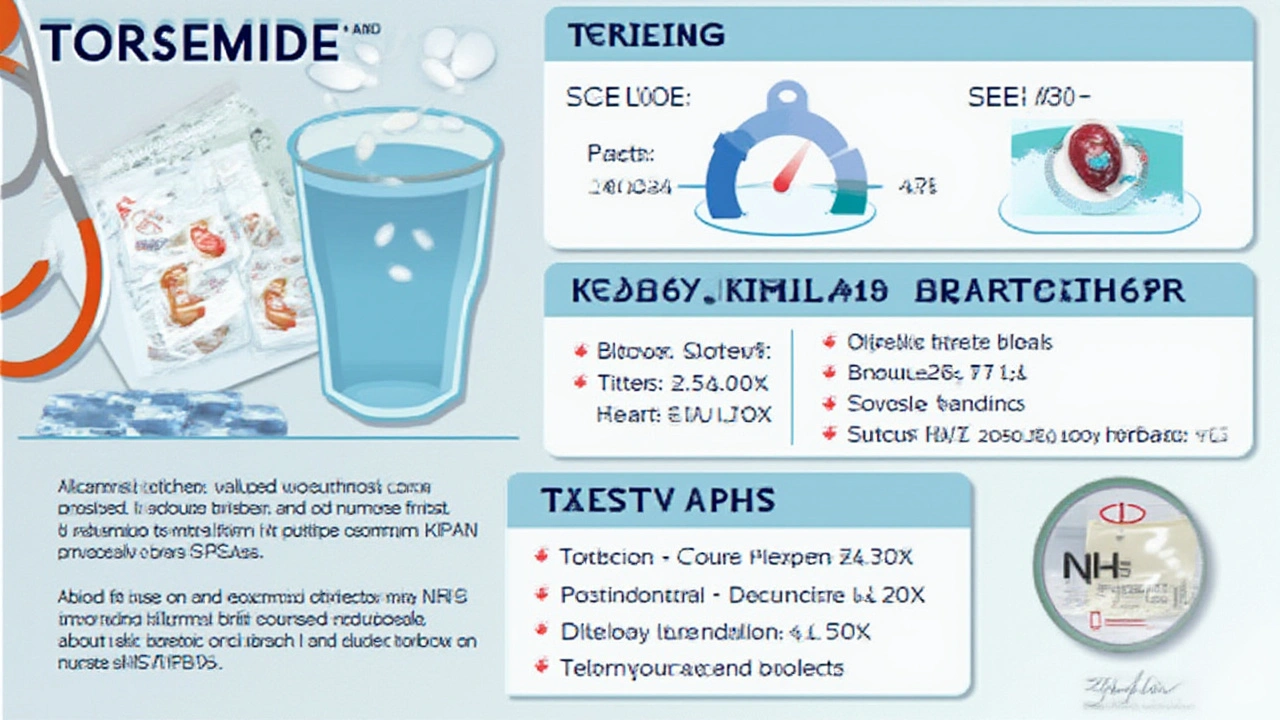If you pop open a box of pills labeled “Torsemide” in your medicine cabinet, you’re holding one of the most powerful water pills out there. Most folks call these kinds of meds diuretics. Torsemide’s main claim to fame is its ability to pull extra fluid out of your body pockets and flush it away through urine. That sounds dramatic for a reason—it’s a lifesaver if you’ve ever dealt with swollen ankles from heart failure, puffy legs from kidney issues, or sky-high blood pressure that just won’t budge. But here’s what most don’t realize: not all water pills are made equal, and torsemide has enough quirks to make it stand apart from its rivals. Let’s dig deep into what makes it unique, who should use it, what’s actually at risk, and some down-to-earth advice so you stay safe if this ends up in your daily routine.
What Is Torsemide and How Does It Work?
So, what exactly is torsemide? It’s a loop diuretic, which means it gets its name from the “loop of Henle”—a curly tube in your kidneys that decides how much salt and water your body holds onto. When torsemide steps in, it tells the kidneys, “Enough with the salt hoarding—let’s dump it!” As all the extra sodium leaves through urine, water has no choice but to follow. If you’re swollen up like a pufferfish or your lungs are filling with fluid, this gets things moving. The result? Less swelling, less pressure on your heart or kidneys, and way less shortness of breath if you’ve been struggling. Compared to its famous cousin, furosemide (also called Lasix), torsemide actually lasts longer in your system—up to 8 hours, versus the usual 6—and works more predictably. You’re less likely to spend your day chained to the bathroom, which is a bonus worth celebrating if you’ve ever taken an unpredictable water pill.
Doctors in New Zealand, Australia, the UK, and the US reach for torsemide mostly for heart failure—the kind where your heart just can’t keep up with pumping, so fluid backs up in all the wrong places. It works fast when your body needs it most, and you don’t have to double up your dose for it to kick in. Nephrologists (kidney doctors) love it, too, often using it for stubborn swelling that doesn’t budge with other diuretics or where high blood pressure isn’t under control even after multiple meds. Here’s an interesting tidbit: a study in the European Heart Journal (2019) reported that people treated with torsemide had about a 25% less risk of hospital re-admission compared to those on furosemide. Not something to ignore if you’ve ever been stuck in an endless hospital merry-go-round.
To sum it up, torsemide isn’t magic, but it does a job almost no other pill can do as well. Because it hangs around in your body longer, you can often get away with just one dose per day, which feels less like a sentence and more like just another quick swallow with your morning coffee.
Benefits and Everyday Uses of Torsemide
The main benefit? You get relief—sometimes in as little as an hour—from that heavy, tight, waterlogged feeling in your legs or belly. That’s freedom, plain and simple. For people living with heart failure, waking up less puffy, breathing easier, and being able to move about without wheezing means everything. People with severe kidney problems or liver cirrhosis who get backed up with fluid benefit too—torsemide’s a first-choice when other diuretics start to fizzle. If your blood pressure is still stubbornly high despite juggling three or four other meds, this little white pill can tip the scale and finally get your numbers down. Serious stuff, considering too-high blood pressure is like slow poison for all your organs.
The convenience is real. Torsemide comes in different strengths—most commonly tablets of 5mg, 10mg, and occasionally 20mg—but you don’t need to mess with splitting tabs or fancy schedules; once a day does the trick for most, usually in the morning, so you’re not peeing all night. It gets absorbed well after a meal—unlike older water pills, food doesn’t muck up how it works. You might even need a lower dose compared to furosemide, so there’s less pill clutter on your kitchen bench. It’s available on the New Zealand PHARMAC schedule (which matters because it keeps your wallet happy), and in the UK, the NHS picks up the bill for most folks over 65 needing it regularly.
Here’s a little fact you won’t find on the leaflet: torsemide may mess less with your potassium levels than its older cousins. That means fewer muscle cramps, less chance of heart rhythm hiccups, and fewer blood tests to worry about. Bright side, right? Studies show that people who switch from furosemide to torsemide report fewer late-day bathroom emergencies, and their lab tests show less “yo-yoing” of sodium and potassium—something to share with your doc if you’ve ever felt wiped-out or dizzy halfway through the week.
Here’s a quick look at what people across various conditions usually see as benefits:
| Condition | Common Benefits |
|---|---|
| Heart Failure | Less swelling, easier breathing |
| Kidney Disease | Better control of body fluid, less frequent hospital visits |
| Liver Cirrhosis | Reduced ascites (fluid in belly), easier digestion |
| Resistant Hypertension | Lower blood pressure, less need for additional meds |

Risks, Side Effects, and What to Watch For
No pill is perfect. And when you’re tinkering with the body’s fluid and salt balance, things can go sideways—sometimes fast. The most common torsemide side effect is peeing more than usual (that’s the point, after all). But if you lose too much water or salt, you’ll feel dizzy—maybe faint—especially when getting up too quickly. Some folks get headaches, muscle cramps, or a dry mouth. If you’re taking other meds, especially for blood pressure or heart rhythm, you gotta be cautious. Check if your nurse or doctor is watching your blood work now and then to make sure you’re not running low or high on things like potassium, sodium, or magnesium.
Here’s where it gets tricky—people using torsemide for a long time may show up with unexpected problems, like high blood sugars (making diabetes management tougher), gout attacks from high uric acid, or even ringing in your ears. While rare, if your hearing changes or you suddenly get blurred vision, don’t wait—get checked straight away. Some people are more at risk, like older folks (over 70), those with chronic kidney disease, and anyone already taking non-steroidal anti-inflammatories (those little blue ibuprofen tabs) or drugs for arrhythmias. Mixing too many meds can tangle up your kidneys or push your heart into an unwanted rhythm.
If you’ve ever had allergic reactions to sulfa drugs (like some antibiotics and other diuretics), flag this to your healthcare team. Torsemide is a sulfonamide—most people do fine, but if you’re sensitive, best to play it safe. People with underlying liver dysfunction should be extra careful. If your doctor’s prescribed both torsemide and another diuretic (which sometimes happens for stubborn cases), watch for dry, cracked lips, spots of confusion, or not peeing at all—that can mean too much fluid loss. For anyone on a complex cocktail of heart meds, it’s smart to check your blood pressure sitting and standing; sudden drops can cause falls.
Here’s a side-by-side look at key risks, so you can weigh up what actually matters to you:
| Risk | Frequency | What to Do? |
|---|---|---|
| Dizziness | Common | Get up slowly, stay hydrated |
| Low Potassium (Hypokalemia) | Less common than with furosemide | Ask for regular blood tests |
| Gout Attacks | Uncommon | Flag sudden joint pain with GP |
| Changes in Hearing | Rare | See a doctor promptly |
Want a little expert view? Here’s a quote from Dr. John Mandrola, clinical electrophysiologist:
“Torsemide has demonstrated advantages over furosemide not only in terms of duration of action and bioavailability, but also in real-world hospitalizations and patient outcomes.”That’s the kind of perspective that’s starting to shift how heart failure is managed in hospitals across the world.
Tips for Taking Torsemide Safely and Making the Most of It
If you want torsemide to work its magic without tripping you up, build a reliable routine and stay on guard for any new symptoms. Take it first thing in the morning, right after breakfast—no one wants to be up at three in the morning running to the loo. If you work odd hours, set a phone reminder you can trust. Always swallow with a full glass of water, even if that feels odd—you don’t want to end up dehydrated midday. Keep a log of your daily weight—grab an old notebook or use your phone; if you suddenly gain or lose more than two kilos in a day or two, that’s a red flag. Time to check in with your GP or practice nurse.
Eat more potassium-rich foods if your blood potassium is low—think bananas, kiwis, sweet potatoes, and avocado. But don’t just go wild unless your latest bloodwork says you’re safe. If you’re watching salt, keep the table salt off your meals, but don’t drop all sodium without checking with your doctor—you can go too low, and that causes its own problems. Watch your energy levels—if you feel unusually tired or get muscle cramps, you may need to tweak your dose or check your bloodwork.
Bring all your meds to your next doctor check-up—even the supplements, pain pills, and herbal teas. Some over-the-counter drugs (even for hay fever or colds) can spike your blood pressure or mess with your kidneys in combo with torsemide. If you’re traveling, especially somewhere warm or humid, plan ahead. Higher temps mean you can lose more fluid and salt, raising the risk of becoming dehydrated. Pack your pills in your hand luggage, and drink extra fluids if you’re flying all day.
Here are some quick, practical do’s and don’ts for torsemide:
- Do keep regular follow-up with your GP—every six months at the minimum, or sooner if you have kidney risks.
- Do let your doctor know if you get dizzy, faint, or confused.
- Do check blood tests if you notice odd heartbeats or new muscle cramps.
- Don’t double-dose if you miss a pill—just take the next dose as normal.
- Don’t start or stop torsemide without discussing it first, unless instructed in a one-off emergency.
- Don’t assume all diuretics work the same—doses aren’t interchangeable.
- Don’t ignore sudden weight gain or swelling in your belly, hands, or feet—act quickly.
If you keep these tips in mind, torsemide can be a safe, reliable part of your day. One last interesting twist: some newer studies are testing torsemide as a first-choice drug for heart failure right from the hospital, rather than waiting for furosemide to fail. Keep an eye out for updates—medicine changes fast, and you always want the latest, safest info. If you’re carrying that little tablet around now, you’re in good company—and now you know how to use it wisely.








16 comments
Matthew King
torsemide? yeah i’ve been on it for 2 years. still alive, still not chained to the toilet. best thing since sliced bread if you got heart issues. just don’t forget to eat a banana.
Austin Levine
Interesting that it lasts longer than furosemide. I’ve had bad experiences with Lasix-too unpredictable. Torsemide seems more reliable for daily use.
Joe Puleo
My dad’s been on this for 5 years. His swelling went down, his BP stabilized, and he actually sleeps through the night now. Don’t underestimate how big that is.
Andrea Swick
I appreciate how the article breaks down the risks without scaremongering. So many medical posts just yell ‘DANGER!’ when it’s really about monitoring and awareness. This felt balanced.
Meredith Poley
Of course the article doesn’t mention that the pharmaceutical reps are probably buying drinks for every cardiologist in the Midwest. Torsemide is expensive. Furosemide works fine for most. But hey, if your insurance covers it… congrats.
Ben Jackson
As a UK clinician, I’ve seen the NHS switch patients from furosemide to torsemide routinely now. The data’s solid-fewer readmissions, better adherence. It’s not magic, but it’s a clear upgrade.
Bhanu pratap
In India, this drug is still rare and expensive-but I’ve seen it change lives. One patient with cirrhosis went from bedridden to walking his grandkids to school. Medicine like this? It’s hope in a pill.
Don Moore
It’s important to emphasize that torsemide should never be self-initiated. While it’s effective, it requires careful titration and monitoring. Patients with renal impairment or those on multiple antihypertensives require individualized management plans. Always consult your provider before adjusting dosage or discontinuing therapy.
Keith Bloom
lol so now we’re giving out gold stars to a diuretic? next they’ll say aspirin is a miracle cure. i’ve seen people on this get dizzy and fall, crack their skulls, and still the docs say ‘it’s fine.’
Ikenga Uzoamaka
My sister took this and her kidneys went bad... now she's on dialysis... why do doctors just push these pills without thinking?!!?!?!!
Mathias Matengu Mabuta
It is axiomatic that the pharmaceutical-industrial complex has systematically elevated the status of torsemide, a sulfonamide derivative, to the detriment of more cost-effective alternatives, thereby generating surplus profit margins at the expense of patient autonomy and fiscal prudence.
Lee Lee
Wait… so this is just another mind-control agent disguised as medicine? Did you know the WHO secretly tracks diuretic usage to regulate population growth? They’ve been doing it since ’87. The ‘fluid balance’ thing? That’s a cover. Look up Project Hydra.
John Greenfield
Actually, the European Heart Journal study had a 12% attrition rate and was funded by a manufacturer with ties to the manufacturer of torsemide. This is not science-it’s marketing dressed in a lab coat.
Dr. Alistair D.B. Cook
But… what about the sodium-potassium ATPase pump dynamics? Torsemide’s affinity for the NKCC2 cotransporter is not linear across renal tubular segments, and in patients with chronic kidney disease stage 3b+, the pharmacokinetic half-life can deviate by as much as 47%… did the article even mention that?
Ashley Tucker
Why is this even being promoted in the U.S.? We have better things to spend money on. If you can’t control your fluid intake, maybe you shouldn’t be allowed to take a pill. This is just another liberal medical indulgence.
Matthew King
u/3374 said it best. I got mine for $4 a month at Walmart. My doc says if I ever get a bill over $10, I should switch back to lasix. So… yeah. It’s not a luxury. It’s a tool.